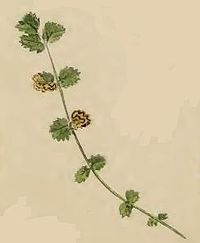Stigmella poterii
| Stigmella poterii | |
|---|---|

| |
| Scientific classification | |
| Domain: | Eukaryota |
| Kingdom: | Animalia |
| Phylum: | Arthropoda |
| Class: | Insecta |
| Order: | Lepidoptera |
| Family: | Nepticulidae |
| Genus: | Stigmella |
| Species: | S. poterii |
| Binomial name | |
| Stigmella poterii (Stainton, 1857) | |
| Synonyms | |
| |
Stigmella poterii is a moth of the family Nepticulidae. It is found from Fennoscandia to the Pyrenees and Italy, and from Ireland to Ukraine.[1]

The wingspan is 3–5 millimetres (0.12–0.20 in).The thick erect hairs on the head vertex are ferruginous and the collar dark brown' The antennal eyecaps are whitish. The forewings are golden-bronze with a pale golden metallic slightly inwards-oblique fascia beyond middle. The apical area beyond this is dark purple-fuscous. Hindwings are grey.[2] [3][4]
Adults fly in June, then a second generation in August and September.
The larva is amber yellow in colour and has a brown-coloured head.[5] It feeds on Filipendula ulmaria, Potentilla anserina, Potentilla erecta, Potentilla palustris, Potentilla tabernaemontani, Rubus arcticus, Rubus chamaemorus, Rubus saxatilis, Sanguisorba minor and Sanguisorba officinalis. They mine the leaves of their host plant.[6]
References
- ^ "Stigmella poterii (Stainton, 1857)". 2.6.2. Fauna Europaea. August 29, 2013. Archived from the original on June 10, 2015. Retrieved November 20, 2013.
- ^ Meyrick, E., 1895 A Handbook of British Lepidoptera MacMillan, London
- ^ lepiforum.de includes images
 This article incorporates text from this source, which is in the public domain.
This article incorporates text from this source, which is in the public domain.
- ^ Emmet, A. M., 1976. Nepticulidae. — In: J. Heath (ed.). The Moths and Butterflies of Great Britain and Ireland 1: 171—267, pls. 1—7, 11, 12.
- ^ "Stigmella poterii (Stainton, 1857)". UK Fly Mines. Retrieved November 20, 2013.
- ^ "Stigmella poterii (Stainton, 1857)". Bladmineerders.nl. Retrieved March 26, 2010.
External links
- Bestimmungshilfe für die in Europa nachgewiesenen Schmetterlingsarten
- Swedish moths
- Stigmella poterii images at Consortium for the Barcode of Life
